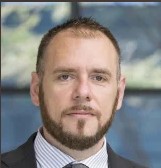报告题目:3D-oriented MOF films and micro-patterns
报告人: Paolo Falcaro

E-mail: paolo.falcaro@tugraz.at
报告时间:2024年9月10日(周二)9:00
报告地点:A01-S501
邀请人:刘进轩
报告摘要:
Metal-Organic Frameworks (MOFs) are promising materials for a variety of applications including sensing, microelectronics, and optics. Despite their exceptional functional properties, protocols for the micro fabrication of MOF-based components are still underdeveloped. However, this is a key-enabling process: controlling the geometrical position, shape, and crystal orientation in micropatterns will enable the implementation of MOF materials in technologically relevant devices.
In this presentation, we will discuss recent developments in the field of oriented MOF films and patterns; specific attention will be given to those procedures involving the use of ceramics as precursor materials. Protocols for the deposition of 3D-oriented polycrystalline Cu-based MOFs via hetero-epitaxial growth from Cu-based ceramics will be presented. A recent strategy that enables the expansion to photolithography for the micro fabrication of 3D-oriented MOF patterns will be examined.
主讲人简介:
Prof. Falcaro is a FRSC and European Research Council Consolidator Awardee with a full professorship in Bio-based Technology and Materials at Graz University of Technology (TU Graz, Graz, Austria). He has a PhD in Materials Engineering with experience in applied research with sol-gel methods (Nanofab, Venice, Italy). He worked at The Commonwealth Scientific and Industrial Research Organisation (CSIRO, Melbourne, Australia) as a materials scientist and team leader. At CSIRO, he supervised an interdisciplinary group of researchers, post-docs, and PhD students developing porous materials such as Metal-Organic Framework (MOF) particles and coatings. Currently, he is leading an international research team at TU Graz. The Falcaro team focuses mostly on two topics: the first is the fabrication of oriented MOF films and patterns with anisotropic properties; the second is the preparation of MOF-based biocomposites for sensing, biocatalysis, and drug delivery. Within TU Graz he is co-leading a multidisciplinary consortium on porous materials called “Porous Materials at Work for Sustainability” (PMWS). He was an editor on CEJ, a guest editor of JMCA, and currently he is part of the advisory board of CrystEngComm.
